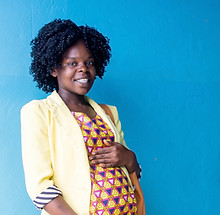Ending preventable maternal and child deaths.
Building Last-Mile Health System in Malawi
Wandikweza is a last-mile health systems builder transforming access to maternal, newborn, child and adolescent health through Proactive Doorstep Care, shifting care from overcrowded facilities to communities, at scale, in partnership with government.
We believe preventable maternal and child deaths can be ended, even among families living in extreme poverty. Grounded in community trust and backed by evidence, Wandikweza delivers a proven, cost-effective model that brings timely, quality care closer to women, newborns, children and adolescents while strengthening primary health systems.
Through our Proactive Doorstep Care (PDC) model, trusted Community Health Workers and Midwives on Wheels provide preventive, promotive and referral services directly at the household level, ensuring continuous care from pregnancy through early childhood and reinforcing the public health system.
Locally led and community based, we work alongside women, adolescents, caregivers and frontline health workers in rural Malawi’s hardest-to-reach communities, removing barriers of cost, distance and access. Together with our partners, we are advancing universal health coverage and fulfilling a simple promise: no mother should die giving life, and no child should die from preventable causes.
From pregnancy through a child’s fifth birthday, families enrolled in PDC receive personalized health support that includes:
1
Doorstep Home Visits
Each family receives continuous doorstep care, one-on-one support from trained Community Health Workers, compassionate follow-up from Midwives on Wheels.
2
Access to Mobile and Facility-Based Services
Families are connected to additional levels of care beyond what is provided during home visits. This ensures they can access the clinical services, tests or treatments that cannot be done at home.
3
Disaster Preparedness and Emergency Response
Families receive support during floods, storms and other disasters, including early warning information, rapid referral for obstetric and newborn emergencies, and coordination of safe transport to the nearest functional health facility.
Our integrated PDC care solutions
Community Health Workers
Community Health Workers (CHWs) are carefully selected and trained community members who serve as trusted health advocates for their neighbors. They provide essential health services right at the doorstep, offering culturally sensitive care that families can rely on throughout their health journey.


Mobile Clinics
Mobile outreach clinics are traveling healthcare units equipped with medical professionals and basic equipment, bringing integrated health services directly to remote villages located beyond 5 kilometers from the nearest health facility. This targeted approach eliminates the need for families to walk long distances or sacrifice daily income to access quality medical care.
Midwives on Wheels
Midwives on Wheels are skilled midwives who navigate challenging terrain by motorbike to serve the most isolated families in hard-to-reach communities. They deliver comprehensive maternal care, from antenatal visits and birth preparedness planning to emergency referrals and critical postpartum home visits within 48 hours of facility discharge.


Health Facility
Health Facilities serve as the clinical cornerstone of the Proactive Doorstep Care model, providing advanced medical services that community-based care cannot deliver. These facilities offer skilled childbirth services with trained birth attendants, manage complex obstetric emergencies and newborn complications and provide a sterile environment for mothers requiring specialized medical intervention.
Our approach works
Behind every statistic is a mother, a newborn or a child whose life has changed, someone who received care in time, found hope at their doorstep and now has a healthier, safer future because our teams showed up.
%20(1)%20(1)%202.jpg)
of women of reproductive age (15-49
years) with access to modern
contraceptive method

of pregnant women register in their first trimester and receive syphilis testing

of births are attended by a skilled health professional

of children with symptoms of malaria, diarrhea, or pneumonia are assessed within 24 hours

The difference is Doorstep Care.
For decades, traditional health systems have struggled to bridge the gap to rural families in critical moments. Facility-centered approaches have deepened health inequities, systematically excluding mothers and children in remote communities from preventive care, timely referrals and emergency support, contributing to a cycle of preventable illness and death.
While traditional systems respond to health crises after they occur, we prevent them entirely. Our Proactive Doorstep Care model serves families from pregnancy through early childhood to adolescence, dismantling the root barriers that maintain cycles of vulnerability. This revolutionary approach builds healthier communities while dramatically reducing the need for expensive emergency interventions.

How We Will Save Lives and Transform Maternal and Child Health
Collective action to end preventable deaths
Our goal is to reach a cumulative total of 3 million individuals by 2030, each benefiting from at least one meaningful maternal, newborn, child or adolescent health service delivered through Wandikweza’s Proactive Doorstep Care platform across seven districts in Malawi. We believe this is achievable through bold leadership, community-driven innovation and collective action, working in close partnership with public health systems to advance universal health coverage and ensure that families living in extreme poverty are no longer left behind.

Where Systems Change Saves Lives
Wandikweza operates at the intersection of maternal and child health, last-mile delivery and system integration, bringing life-saving care to families, at scale.
.png)











.png)